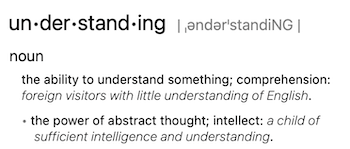I prompted Perplexity to tell me if scientists had determined how many thoughts we think every day. Obviously nobody knows for certain but 6,200 is the number she came up with. As I prepared to include a link to her findings in this post, I discovered I could create a “page” and publish that (somewhere) on Perplexity. While I didn’t write a single word of that page, I guess I get credit for the prompt? (“Curated by smays”)
Looking at the tag cloud on my blog I learned I have posted on the topic of “thoughts” 39 times going back fourteen years. A blog rabbit hole I couldn’t resist. Didn’t read them all but plan to read one each morning for the next month. I did, however, scrape some bits to give you a taste. (Each of these from a different source)
“I’m imagining a technology that doesn’t exist. Yet. A lightweight set of electrodes that monitors my brainwaves and transcribes (transmitted via Bluetooth to my mobile device, let’s say) my thoughts. An advanced version of today’s voice-to-text apps. We get to read that “stream of consciousness” at long last.”
“Thoughts think themselves.” […] “Feelings are, among other things, your brain’s way of labeling the importance of thoughts, and importance determines which thoughts enter consciousness.”
“If I re-google my own email (stored in a cloud) to find out what I said (which I do) or rely on the cloud for my memory, where does my “I” end and the cloud start? If all the images of my life, and all the snippets of my interests, and all of my notes and all my chitchat with friends, and all my choices, and all my recommendations, and all my thoughts, and all my wishes — if all this is sitting somewhere, but nowhere in particular, it changes how I think of myself. […] The cloud is our extended soul. Or, if you prefer, our extended self.”
“The problem is not thoughts themselves but the state of thinking without knowing we are thinking.”
“Even if your life depended on it, you could not spend a full minute free of thought. […] We spend our lives lost in thought. […] Taking oneself to be the thinking of one’s thoughts is a delusion.”
“Look at other people and ask yourself if you are really seeing them or just your thoughts about them. Sometimes our thoughts act like “dream glasses.”
“We often see our thoughts, or someone else’s, instead of seeing what is right in front of us or inside of us.”
“Our minds are just one perception or thought after another, one piled on another. You, the person, is not separate from these thoughts, the thing having them. Rather you just are the collection of these thoughts.”



